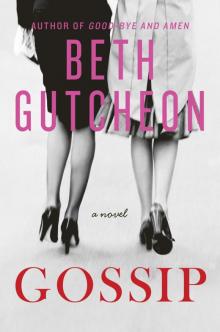- Home
- Beth Gutcheon
Dead at Breakfast Page 13
Dead at Breakfast Read online
Page 13
For the Poole sisters, the flight across the country had never seemed longer. Lisa sat with Colette in her lap and her huge sunglasses on, looking out the window, as the plane lifted smoothly off the airstrip and banked south. Below, the state of Maine seemed a wilderness of greenish-black evergreens, as if it had barely been settled at all. When she’d arrived six days ago, she’d had a husband and four children. Today she had a dead step-daughter, a broken nose, and an ankle that would never be right, and what was left of her husband was traveling with the luggage.
She was still on oxycodone, because she hated pain, but she didn’t like the way it made her feel. It was constipating and it wasn’t right to be less than completely present at such a moment in her life. She didn’t like the way her thoughts seemed liquid, flowing into one another, as if all time was present and always had been. She knew that there had been times, really important ones, when she’d let life happen to her. She’d somehow found herself married to a man she had meant only to enter a few rooms with because they made a beautiful couple. She thought he was going to be eye candy, but he turned out to be more like a mangle, powerful and determined to a degree she hadn’t experienced before. She hadn’t really thought of herself as a mother; she had thought she would be someone herself, do something, turn heads and cause talk, maybe start a fashion business or write a best seller. She had meant to marry a rich American with a trust fund and a degree from the Harvard Business School, not whatever Alex had turned out to be.
But Alex didn’t just think his life was going to be a certain way, he knew, and when she found she was part of his certainty and tried to wiggle loose, he slept with her sister. Why that had led to her marrying him instead of . . . that piece seemed to be gone. But she didn’t want this one to be. She was a widow. Widow. A sleek, golden-tanned widow, with a suitcase full of silk and suede clothing and her husband right next to it, all his big American dreams in the dark, in a double-wide box. Beautiful, lithe, powerful young Alex—he had wanted to be called Alec, one of the few things he wanted that never happened. Immigrant on the hustle, and such a marvel to watch, how quickly he learned, how he impressed men with ten times his privilege and education, got them to invest in him, and proved them right. The way women watched him when he crossed a room, even after he’d started to balloon, he moved like a dancer and made you think about what he’d be like in bed.
She knew that the dead come to you in dreams, especially when they’ve been wrenched from life unprepared. She didn’t want to miss that. She didn’t want Jenny to try to get to her and find a scrim of drugs keeping her out, as so much had kept her out in life. Wasn’t that just Jenny exactly, a soul so full of want, right outside, able to see what she was trying to get to, but always behind glass, kept out by something invisible but obdurate. Crying. She was like a spirit, banging at the windows, crying but not making a sound. She felt that Jenny was crying, and she wanted to be open to her if, finally, she could help.
Colette began to wiggle on Lisa’s lap. Glory, who had taken one of Lisa’s oxycodones, she was a nervous traveler, was her excuse, didn’t notice at first. Usually she was more attuned to what the dog needed than her sister was. More attuned to what Alex Antippas needed too, for that matter, though her interest in that was long behind them. Behind them, beneath them, literally at the moment beneath their feet, but beneath them in all ways. She shouldn’t have crossed that line with him, but then if she hadn’t, she’d never have known for sure that she shouldn’t. She, Gloria, had always been a tuning fork, vibrating in response to what emanated from other beings, and something in Alex had been calling to her, unmistakably. It was her problem with men, insofar as she had a problem with them, that she knew exactly what they were thinking, what they wanted, when they were lying, when they were coming on. They didn’t like it, as a rule. They didn’t like being known. Women did, usually. Men thought it was a trick, rather than her strength as a woman. She wondered, if she’d had children of her own, if they would have adored her for her ability to really see them, or resented it, as men did. Most men. Not Alex, but he had been unusual. Very unusual. Not necessarily in good ways, but they had recognized something in each other. And now, he was a charred lump.
She had not infrequently wanted him dead. Didn’t like how he treated people, especially her sister, and also minded that he’d chosen Lisa and not her, even though he admitted Glory was better in bed. And now he was dead, and something unexpected and unpleasant had happened: she remembered she had once been in love with him.
Why was Lisa trying to get up? Oh the dog.
Glory said, “Stay, I’ll get her.” She rooted around in the dog bag for a Wee-Wee Pad, and put it down in the aisle between them. Colette jumped down from Lisa’s lap, squatted, and emitted a puddle of a size to indicate that Glory had intervened at the last possible minute.
Colette hopped back to Lisa’s lap while Glory took the sopping pad into the bathroom and put it in the trash. She washed her hands, while checking her makeup in the mirror. She looked like hell. She had run out of her own shampoo, and the stuff the hotel gave you left her hair looking like something you’d scour a pan with. And her roots were showing. She’d brought her color formula with her in case she had to get a touch-up before she got home, but obviously that hadn’t happened. The light in these airplane bathrooms was horrible; it looked as if she had two black eyes. God it would be good to sleep in her own bed.
But there was much to go through before that happened. The press would be at the airport. The people from Forest Lawn would be there to take Alex away. He would be buried beside Jenny; he had barely outlived her. If the lawyer had managed to buy the plot they wanted. Had that happened? She couldn’t remember. It was good that at least her sister wouldn’t have to get off the plane soaked with dog piss.
She slept a little. She woke and wondered if, when they stopped in Denver to refuel, she would have time to pop into the airport and have her nails done. But no, they’d be out at the private terminal, where there weren’t any services. She’d just have to remember to keep her hands away from her face when they got to L.A., if the photographers were there, and she was sure they would be. Jenny’s press agent would never be able to resist tipping them off.
One thing she could say, this terrible week had been great for her career. She was booked on morning talk shows three days this week, and the producer of her old cable show had been calling to talk about a special on grieving. Her stylist was collecting wardrobe for her, and her hair person would come to the house tomorrow evening. She was planning to stay with her sister for the next few days, or until she was sure Lisa could cope. Jenny’s manager, the scumbag, had arranged for a star-studded “Celebration of Artemis’s Life” at the Staples Center for Monday, Columbus Day, when the whole world would be home from school and work and able to tune in. Taylor Swift was coming. Lady Gaga was in Europe but had sent a tribute video. Cissy Houston would sing a gospel hymn, and read a prayer for Artemis and Whitney. Maybe she could spin the grief special into a series. She could do a couple of shows on addiction and recovery, and at least one on the perils of child stardom. She knew somebody who knew somebody who knew Britbrit’s press rep. Brit would be a great get, if she could pull it off.
And when were they going to bury Alex? They’d been ordered not to have him cremated, as if he weren’t half-cremated already, until the toxicology reports were definitive. They still didn’t know what had killed him. Maybe they never would, it wasn’t exactly NCIS up there. That deputy sheriff, Bubbah or whatever he was called, she’d known kids like that. Poster child for ADHD, hadn’t anyone up there heard of psychopharmacology? He couldn’t sit still, he was always tapping or jiggling something, he was always in the wrong place, looking the wrong way. Cue the Ritalin fairy. How many times had he asked her if she was sure her sister hadn’t left their room the night of the fire. Left their room? Lisa could barely leave her bed. Glory had been afraid she was going to have to call housekeeping for a bedpan for her, as if anyone ha
d one of those in the linen closet anymore. Except actually, a place like that inn, a great monument to life in 1885, probably did. They probably had hot water bottles.
Someday, if it was ever all right to laugh about any of this, she could do a very funny imitation of the great detective, solemnly asking, “When were you born? Do you know what time? Can you find out?” It would make a marvelous skit. She was good at imitations too, a great mimic.
Gabriel Gurrell, who hadn’t been off the grounds of the inn since a brief trip to the drugstore in Bergen Falls Wednesday morning, was not rushing his trip back from Bangor. He’d been in crisis mode since the smoke alarm went off early Thursday morning, and he needed the silence. For some reason a song from his youth kept playing on the jukebox in his head: “Mama said there’d be days like this, there’d be days like this, my mama said . . .”
Except Mama had not remotely told him there would be days like this, let alone a week like this. He felt as if he would start gibbering and making obscene gestures if he didn’t get some quiet, a hot shower, and a proper night’s sleep. What had made him imagine that running a country inn in some rural backwater was going to be a peaceful life?
His insurance agent wasn’t calling him back. “Family emergency,” his girl said. The guy was quick enough to pick up the phone when he was selling.
No. No. No, he wasn’t going to think about his fire insurance, or rebuilding, or whether he could keep the rest of the hotel open during the construction, and if so how? Welcome to peaceful Oquossoc, where the shrieking of power saws and the crashing of hammers start at seven in the morning and don’t stop until three? Welcome to historic Oquossoc, where every guest receives a construction-grade set of ear protectors at check-in?
What were the chances he could get a contractor to wait until nine in the morning to make noise?
None. No chance. The workday started here at seven whether you had cows to milk or not. Electricity might as well not have been invented, the workday was the same as it had been when it was rise with the sun and go to bed when it gets dark.
Stop. If he couldn’t stop running around this hamster wheel, trying to answer questions that had no answers, he would go mental.
He’d danced to “Mama Said” one summer at Rehoboth Beach when he was . . . fifteen? Mid-1960s? With that girl with the Jean Seberg haircut, whose father raised chinchillas. His sister Jean had a huge collection of girl-group 45s that she kept in their pristine paper sleeves, in a little square sort of suitcase for carrying records to parties. They were filed in there like legal briefs. C for the Crystals, D for the Dixie Cups, S for the Shirelles. His sister had a battery-driven record player too, and one night he had liberated them from her room in the little screened cottage they rented for two weeks in the summer, and been the hero of the beach party. Mama said there’d be days like this. Will you still love me tomorrow? “Rockin’ Robin.” Tweedleytweedleydee. Tweedleydeedleydee. Robin was the girl’s name. She showed him which star was Betelgeuse. Sand between his toes and in the cuffs of his blue jeans. Firelight. Rolling Rock beer.
What his mother actually said, when his sister found that the needle on her record player was ruined and there was sand in most of her tenderly-cared-for record sleeves, was, “Oh Jean, he didn’t mean to. Pour me another one, will you, hon?”
To her two fatherless children, the two weeks at Rehoboth was a beach vacation. They could do everything they wanted to do on foot or on bikes. To Doris Gurrell, it was two weeks in a gin bottle. Gabe had never, before or since, known a person who took such deep pleasure in getting blotto, day after day, starting with beer for breakfast. The rest of the year she worked two jobs, made sure the children had clean clothes and a hot meal at night, and only took a drink or two on weekends. When he was growing up, he had dreaded the thought of his mother retiring. What would there be to keep her from drinking all day every day until she died? But she had surprised them. When she retired, she gave up drinking altogether, took lessons in dancing the tango, and married one of her elderly dance partners. He took her on tango cruises to Nassau and the Bahamas every winter and left her very well provided for when he hung up his last pair of dancing shoes.
Gabe was working at the Biltmore in Santa Barbara by that time, and he was so relieved to know that he didn’t have to worry about taking care of his mother any more that he impulsively married a girl he didn’t know nearly well enough, as it turned out. The marriage ended abruptly, two years in, when he learned she had had an abortion without telling him and had no intention of having children. How had he happened not to have discussed this topic before that euphoric week when rushing down to City Hall with this beautiful creature had seemed like such a good idea? Youth was a condition defined by the fact that you don’t know what you don’t know until it’s too late.
He’d assumed for years that he’d marry again and have children sooner or later, but whether because that early mistake had made him overcautious, or for some other reason, it never happened. Women were so irate about all that it cost them to be the child bearers during those bra-burning, hairy armpit years, the mess of their periods, cramps and headaches, childbirth itself . . . but how about the fact that if they wanted to have babies, they could?
When he first met Sarah, he was managing the Clift in San Francisco, a small gem of a hotel off Union Square that catered to the old line, well-born, well-heeled traveler. She had had a small restaurant of her own back east, she said, dinner service only, but running her own place had been too much for her, and like so many people who want a fresh start, she decided to try California. She had taken the only job that was open at the Clift kitchen where she had friends, doing food prep and other lowly tasks. It was a little puzzling, since the nature of the job didn’t sync with her résumé, but she said she wanted the experience of a big kitchen. And she needed the health insurance. The executive chef had liked her and moved her up quickly; her cooking skills were real. What was clear to Gabe, though, was that she’d had some kind of very hard time. Romantic, financial, some kind of breakdown. He didn’t know what, and she wasn’t talking, but certain things made him think she’d been living very close to the edge. She was much too thin, and she had the health problems of a person who couldn’t or wouldn’t take care of herself. At first, given his own experience with his mother, he suspected substance abuse, but he knew the signs very well, and she didn’t have them. She wasn’t impulsive, or compulsive. She didn’t lie, there were no unexplained absences. She could take a glass of wine, no problem, and not reach for another.
He’d been attracted to her from the start. They were of similar ages, and her diction and manners told a different story from her battered appearance. He liked a woman with a bit of mystery, and he paid attention to her. She was having a problem with her neck when they first met, and he sent her to a celebrity chiropractor. The chiropractor discovered she was missing two teeth in the back of her lower jaw and said Oh, well, no wonder. He couldn’t fix her until she had the teeth replaced. Gabe lent her money to have the work done, since even the hotel’s fancy health plan didn’t cover it. She accepted his friendship, at first warily, but eventually, warmly. The teeth were fixed, her neck pain went away, her skin and hair looked better, healthy, and she gradually filled out and began to smile and laugh more. For a brief, to Gabe heavenly, interlude they were lovers. Then a restaurant out in the avenues offered Sarah her own kitchen, and she was gone. Eventually the Clift was sold to one of those “groups” that believe that a hotel lobby should be so dim that you need a flashlight to sign the guest register, and attracted young hipsters from Europe or the movie business wearing black and sporting name brand luggage, watches, and strollers. Even their babies wore black. Gabe decided it was time to go back east. They didn’t see each other again for years, until he bought the inn and asked her to come with him, and she came.
As he drove into Bergen, he had a sudden thought of the lunch tray that would be sent up to him as soon as he was back in his office. A big tumbler full
of green slime that Sarah made for him, two rye crisp crackers, and a pot of green tea. Every once in a while he called down to the kitchen and asked for a club sandwich or a bacon cheeseburger, and Sarah laughed, and sent green slime. He was allowed to eat whatever he wanted for dinner, that was something. And of course, there was always the chance that if he got down to fighting trim she would marry him, though his belief in that was, he recognized, a triumph of hope over experience.
Just Barb’s. A plate of fried shrimp with tartar sauce, coleslaw, and French fries. A real Coke, with caffeine and sugar in it. He passed the restaurant, regretted it, stopped at the corner, and parked the car.
Shep Gordon and Carson Bailey were sitting in a booth, drinking coffee. Shep gave Gabe a wave, beckoning him over. “Take a pew,” Shep said expansively, and Carson scooted over to make room.
“You look like you’re just finishing up.”
“We’ve got most of the problems of the world solved,” said Shep. Evidently they were in the mood for company. Or an audience. Gabe sat down. Sandra appeared, and took his order.
“You got anybody left up at the inn?” Shep asked.
“Mrs. Babbin and her friend. They’re staying on for a few more days. Mr. Clark was still there when I left this morning, but I think he leaves tonight.”

 The Affliction
The Affliction Dead at Breakfast
Dead at Breakfast Good-bye and Amen
Good-bye and Amen Leeway Cottage
Leeway Cottage Gossip
Gossip Saying Grace
Saying Grace